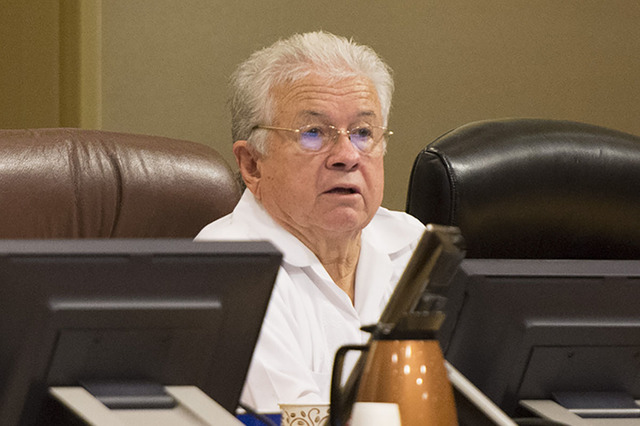Former Nevada lawmakers on different side of property tax vote as local officials

Several Southern Nevada elected officials were state legislators when they voted for a property tax cap measure that local governments around the state are lobbying to reform.
The turn of events isn’t because local officials want to see the caps that date back to 2005 lifted, however. Many say the law’s unintended consequences have created a disconnect between economic growth and property tax revenue.
Officials widely agree that the caps served their purpose in tempering property tax bills in a time of excessive growth, before the recession. It’s the other provisions that were passed as part of the tax cap law that a number of local government officials want to see changed.
“It’s done some damage,” said Las Vegas City Councilman Bob Coffin, who was a state senator in 2005. “It’s caused our revenues, as low as they are from property taxes, to be below where they need to be.”
In 2005, the Nevada Legislature capped property tax increases at 3 percent for owner-occupied residential properties and at 8 percent for other residential and commercial properties.
Population continues to rise in the valley, oftentimes growing the demand for government services, but property taxes haven’t grown at the same rate. The property tax pinch is apparent in the city of Las Vegas public safety spending, the biggest portion of the city’s annual budget.
During the city’s budget talks last year, Coffin voiced concerns about rising crime and said while the public safety share of the city’s annual spending has ballooned, without an increase in property tax revenue, other city services suffer.
Brian McAnallen, the city’s government affairs manager, said the city is advocating a longer-term study of the property tax structure and possible future reform “rather than waiting until the next crisis and then trying to dig ourselves out of it.”
The property tax cap law, aimed at keeping property taxes in check, was written when property values were growing faster than the rate of inflation. The calculation for the current fiscal year for local governments like Las Vegas and Clark County resulted in an increase capped at 0.2 percent.
The Nevada Association of Counties has requested a bill to modify the formulas used to calculate property tax increases and set a 3 percent floor for annual commercial property tax increases, but leave intact the 3 and 8 percent caps.
That bill appears destined for a fight — the state Senate’s top Republican Michael Roberson told the Review-Journal last month Assembly Bill 43 “has no hope” of becoming a law.
Local government officials vary in their views on reform. Las Vegas City Councilman Stavros Anthony said he doesn’t have a problem “looking” at the property tax cap formula.
“What I do not want is for people’s property taxes to go up,” Anthony said, noting that some residents continue to struggle financially.
North Las Vegas Mayor John Lee, also a state senator in 2005, said he will take a wait-and-see approach on the issue.
“It’s probably going to be discussed during the next legislative session, but I’m just going to watch,” Lee said. “In the meantime, I’m going to grow the city, I’m going to use economic development and we’re bringing new businesses and opportunities. I’m not going to lament the fact that there’s an opportunity to raise taxes. I’m going to build the city without that.”
Property tax reform was a big topic at the Southern Nevada Forum, which in January brought together state and local elected officials, taxpayer groups and business leaders in Las Vegas to hash out regional priorities prior to the 2017 session.
Henderson Mayor Andy Hafen said he supports an adjustment of the secondary cap.
“Property taxes are one of the most stable forms of taxes and sources of revenue,” Hafen said. “We, as elected officials throughout the state, just want to see some of the financial stability come back into play.”
Staff writers Art Marroquin and Sandy Lopez contributed to this report. Contact Jamie Munks at jmunks@reviewjournal.com or 702-383-0340. Find @JamieMunksRJ on Twitter.